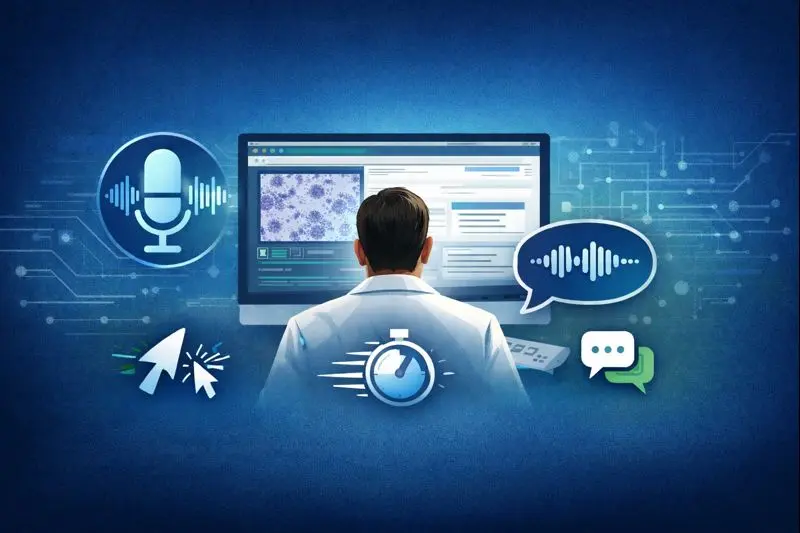Blog
Clinical Laboratory Management Solutions for Lab Revenue Cycle Management (Lab RCM)
September 3, 2025
Healthcare systems and medical labs rely on the right clinical lab workflow and pathology management software to efficiently manage resources and deliver diagnoses without encountering obstacles resulting from ineffective laboratory billing documentation, delays, or denied claims. Thus, advanced laboratory information systems (LIS systems, LIS software) that can support lab billing/laboratory revenue cycle management (lab RCM) to automate functions related to the different stages of generating and remitting medical bills are the best LIS at protecting lab revenue.
Problems and Solutions: Laboratory Information Systems and Laboratory Billing Solutions
The laboratory billing process involves financial laboratory software systems that automate the RCM cycle to identify and generate medical bills, process claims and payments, and collect revenue for testing services rendered.
When done properly, the laboratory billing process begins with the patient’s first interaction with the testing organization and its laboratory information system, and ends when the lab receives full payment for its services.
Effective laboratory revenue cycle management follows seven key steps:
- Pre-registration
- Registration
- Charge Capture
- Claim Submission
- Remittance Processing
- Insurance Follow-up
- Patient Collections
Each important step in the lab RCM process identifies and utilizes patient data to make an insurance claim, and then follows up with the claim until the final payment is made.
However, clinical labs and anatomic pathology practices face common problems with laboratory billing performed without the right RCM tools and support from the RCM management company. Moreover, these common problems can be eliminated if the lab chooses an all-in-one medical laboratory information system that also provides advanced embedded billing software for labs within the same application.
Discover More: Reduce Denials and Stop Revenue Leakage With Integrated Laboratory Billing Management
Medical laboratories handle large volumes of patient data (managed by the laboratory information system) to process samples and deliver timely results. A medical lab requires a laboratory information system software solution to process sensitive patient data and work well with its lab revenue cycle management solution to handle the laboratory billing process.
Traditionally, two separate laboratory software systems have been used: LIS system software for handling patient information and lab data, and lab revenue cycle management software for lab billing purposes. Thus, in most cases, the laboratory billing process doesn’t start until after the test results have been prepared.
This lab billing scenario often leads to denied claims due to incorrect or missing patient information. On the other hand, an effective laboratory billing process reduces denied claims by receiving claim information upstream, and as the order comes into the lab. This translates into much fewer denied claims and more revenue capture downstream.
A clinical laboratory management solution that includes lab billing software is thus the ideally constructed way for them to meet RCM cycle requirements and risk estimation.
Lost revenue often results when labs lack advanced LIS software with integrated lab billing capabilities. Causes include delayed claim submission, incomplete documentation, reimbursement errors, or incorrect coding that mismatches samples with test codes. These issues can be minimized with modern laboratory information systems that feature embedded, transparent laboratory billing solutions.
Discover More: Maximizing Your Lab’s Profitability: The Case for In-House Lab Billing

The Role of Advanced Laboratory Billing Solutions
Advanced laboratory billing solutions keep labs running smoothly by helping the LIS quickly digitize the revenue cycle management (RCM) process. They use patient data collected during pre-registration and registration to start and file accurate insurance claims.
By automating the RCM cycle, modern laboratory billing software supports directors and managers with claim follow-ups while reducing errors such as mismatched test services and medical codes. These systems also validate claims and confirm insurance status, ensuring accuracy throughout the process.
Still, lab leaders must understand every step of sample processing and claim tracking to maintain an efficient lab billing workflow.
Transparent policies and advanced laboratory billing solutions help patients and laboratories manage their resources more effectively. To accomplish this, lab billing policies must be displayed on the testing service’s website and communicated to the patient during pre-registration. The patient should also be informed of the various accepted payment modes so that he/she is prepared with insurance details during the registration RCM process.
Co-payments may be collected at the time of patient registration, and referrals are required when a patient needs medical attention from a specialist. The registration laboratory billing process must also include steps to assign benefits and record patient signatures on the requisite forms. These ensure the smooth dissemination of insurance claims.
Claims are ‘scrubbed’ before submission, where advanced clinical laboratory billing solutions are managed by a dedicated lab revenue cycle management team that assesses the test charges, ensures no code mismatches, and structures the claim for maximum revenue capture.
Integrating Modern Laboratory Billing Solutions with Laboratory Information System Software
An efficient laboratory information system software with embedded laboratory billing solutions can address various challenges during the insurance capture, claim, and collection processes.
When a patient enters a healthcare system for lab testing, the medical staff captures and transfers their data into a laboratory information system, which verifies the patient’s scheduling and eligibility.
Efficient and advanced LIS systems that feature modern laboratory billing solutions also help directors and managers resubmit denied claims through real-time monitoring of claim status. These laboratory billing solutions also produce the reports required every three years by the Centers for Medicare & Medicaid Services (CMS) to meet financial compliance regulations.
An LIS medical system that contains a powerful lab RCM solution improves the staff’s ability to manage and track various processes from a single interface. It can also integrate with a patient’s electronic health record (EHR), improving the accessibility and tracking of patient information within the health system.
Laboratory information systems with advanced laboratory billing solutions should capture (at an early stage) various details about a patient’s eligibility for making an insurance claim, so questions regarding payments do not crop up in later stages. LIS systems with claim management solutions should also be able to track the progress of an insurance claim, and the medical LIS/lab billing system should generate timely reminders to help manage multiple payment schedules.
A health institution with a strong infrastructure for information technology can easily set up and maintain modern LIS software with advanced laboratory billing capabilities.
Case Study: Summit Pathology - Achieving Laboratory Profitability Amidst Operational Pressures

Alternative Laboratory Billing Solutions
Some testing organizations choose to outsource lab billing to third-party services. These solutions can integrate with a lab’s LIS system, giving staff timely access to lab revenue cycle management data stored either in the cloud or on local servers.
Labs can also boost revenue capture by expanding their outreach, a strategy especially effective for those designed to scale. During the COVID-19 pandemic, many labs improved margins by offering direct-to-consumer lab testing through platforms like TestDirectly. For this reason, advanced LIS software should be scalable to handle surges in demand during times of crisis.
Discover More: Highlighting the Versatility of the TestDirectly Direct-to-Consumer Lab Testing Portal
Some labs require specific LIS system software configurations that address their unique demands, such as highly specialized procedures and diagnoses, or lab billing dynamics. Clinical/pathology lab management solutions should account for the large influx of patient data and samples, and could thus benefit from a third-party vendor.
Advanced medical LIS and lab RCM informatics solutions help ensure clinical labs can check patient eligibility for an insurance claim, even before their samples are processed. This saves time and prioritizes claims for swift approval and reimbursement, ultimately improving patient care.
A third-party laboratory billing system can provide application programming interfaces (API) that connect lab billing service solutions with the lab’s existing LIS system. It can also be interfaced with electronic health record (EHR) systems.
Like in-house laboratory billing systems, third-party financial services can streamline key processes such as claim scrubbing, insurance follow-ups, and compliance reporting, all while helping labs increase revenue and scale effectively.
Discover More: Laboratory Billing 101: The Differences Between In-House Billing and Outsourced Billing Services
Unlock Higher Collections and Lower Denials with LigoLab’s Advanced Billing Solutions.
Automate your lab’s revenue cycle, eliminate errors, and give your team the RCM tools to scale with confidence.






